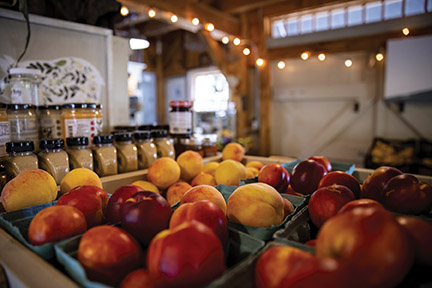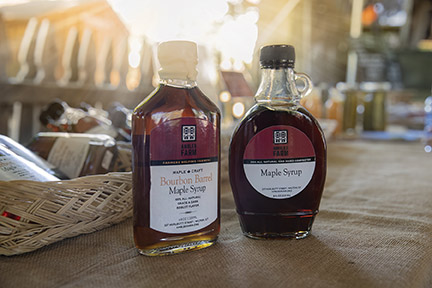Patti Popp is a bit of a celebrity in Easton and the surrounding towns. She is bright, energetic, and bursting with knowledge about farming, cooking, and serving local food. She and her husband Al took over an old farm and farmhouse located at 596 Sport Hill Rd in Easton in 2000 and named it Sport Hill Farm. Over the years, they have turned it into a thriving business and mecca for foodies seeking hyperlocal food that has a very short journey from farm to plate. Sport Hill Farms Marinara is Patti’s #1 seller. James, a 12-year-old shopper and budding gourmand from Easton, describes the sauce as “light and fresh,” and I agree.
 This sauce is made with just a few simple ingredients picked at the height of the season and jarred for consumption any time of year. A comforting and familiar mélange of tomatoes, onions, basil, olive oil, salt, garlic, and a touch of black pepper shine in this vegan-friendly concoction. Serve some on top of organic zoodles (zucchini noodles) from Patti’s farm freezer and add a sprinkling of Pecorino Romano Cheese. The slightly grassy flavor of the cheese blends perfectly with the sauce. Their homemade butternut squash soup is excellent as a soup and even better when mixed with a bit of crème fraiche and poured over gnocchi.
This sauce is made with just a few simple ingredients picked at the height of the season and jarred for consumption any time of year. A comforting and familiar mélange of tomatoes, onions, basil, olive oil, salt, garlic, and a touch of black pepper shine in this vegan-friendly concoction. Serve some on top of organic zoodles (zucchini noodles) from Patti’s farm freezer and add a sprinkling of Pecorino Romano Cheese. The slightly grassy flavor of the cheese blends perfectly with the sauce. Their homemade butternut squash soup is excellent as a soup and even better when mixed with a bit of crème fraiche and poured over gnocchi.
If you are looking for local cheeses, meat, pasta, eggs, or dairy, you’ll also find that at Sport Hill. Depending on the season, 75-90% of the produce Patti sells is from her farm, and the rest is as local as she can find it. “We grow and sell what is in season. I talk to people about what is local this time of year and help them understand what they are eating and why it is so much better to eat with the seasons,” she says.
During the Pandemic and throughout her career, Patti has had to learn how to reinvent her business to address consumer needs and buying trends.
“The key word is pivot. During the Pandemic, we had to quickly figure out how to create a sustainable business model that allowed us to serve our local customers and follow the many social distancing laws,” Popp explains. “I’m an antiquer, and I love the thrill of the hunt. During the Covid 19 pandemic, I started selling upcycled items because people weren’t comfortable going into stores. So, this year we decided to focus on Farm, Flea, and CBD,” she says. Patti’s husband Al has been growing hemp in their fields, and they use the products to produce Popps CBD products. “Some people say it helps them with anxiety; some claim it helps them sleep better,” Popp says. She tells me she has found some relief from her husband’s products. If you visit Sport Hill Farm on a Sunday this fall, you will discover Flea market treasures and farm-grown pumpkins, eggplant, squash, and other seasonal harvest veggies. Patti also rents out her loft in the fall and winter and has some partnerships with local vendors to create “micro-events” such as small dinner parties and mini weddings. “People are looking for new experiences, so we want to provide that,” Popp says, as she flashes with her warm signature smile.
A Wilton Treasure
 Ambler Farm is another local treasure owned by the town and run by Friends of Ambler Farm. Located on 257 Hurlbutt Street in Wilton, this working farm is over 200 years old and “open to the public dawn to dusk, 365,” according to their Director of Agriculture, Jonathan Kirschner.
Ambler Farm is another local treasure owned by the town and run by Friends of Ambler Farm. Located on 257 Hurlbutt Street in Wilton, this working farm is over 200 years old and “open to the public dawn to dusk, 365,” according to their Director of Agriculture, Jonathan Kirschner.
They have a space at the Wilton Farmer’s Market on Wednesdays, and the farm stand is open from 9:00 AM – 2:00 PM on Saturdays and offers local organic produce they grow and source from other local farms. If you enjoy arugula with lots of peppery flavor—be sure to sample some from Ambler Farm. Much like the “rocket salad” I experienced recently in Italy, this arugula has a stronger taste and a larger leaf than you will find in the grocery store. “A lot of the arugula you get in the store is grown hydroponically or travels a far distance, so you lose some of the flavor—some of that bite,” Kirschner explains.From an Epicurean perspective, I am particularly interested in their Maple syrup. It’s a beautiful amber concoction and has a reputation as some of the best in the state. Visitors are invited to watch them make maple syrup in the winter.
Sap is collected in buckets, then boiled down in a shed traditionally called a sugarhouse. Ambler is a teaching farm with many programs for kids, so I shouldn’t be surprised to learn something new and fascinating from Mr. Kirschner. “The traditional season to make maple syrup in Connecticut is from early February through late March,” Kirschner explains. Night temperatures need to get down to 20 °F, and the days into the 40’s are required for the maple tree to yield sap.”
“Unfortunately, syrup production is one of the things being impacted by climate change,” Kirschner explains. “We can’t guarantee those cold nights—so it’s harder for us to predict when to start tapping the trees. The proposed solutions will likely be technological, with larger producers growing rows of Maple trees and then cutting off the taps and vacuuming them to remove the sap. But there are plenty of small farms and local places like us that will continue to do it the old-fashioned way, with a bucket,” he says.
Ambler has a carriage house and other facilities available for events from April-December. In addition, they host a farm-to-table event every June.
“People can adopt a sugar maple on the property, and every week during the season, they are invited to bring sap over to the sugar shack and see and taste the process—at the end of the season, they walk away with a bottle of syrup, which they helped produce” Ashley Kineon, Executive Director, explains.
“Our biggest fundraiser and event is Ambler Farm Day. This year it will be held on Sunday, October 2, and we will have a hay maze, hayrides, apple slinging, and other fun events,” Kineon says. Head to their site amblerfarm.org to learn about a wide range of events planned this year. •